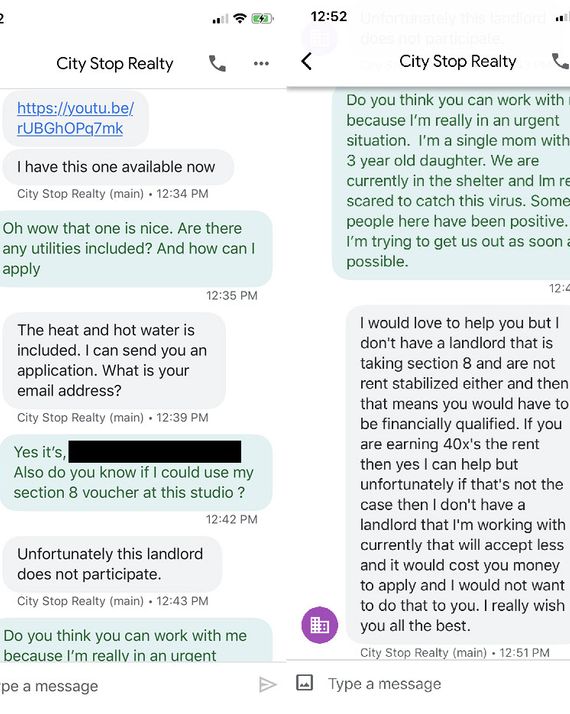
It took 15 years for Nancy Padilla to claw her way out of the city’s shelter system. She should have been able to rent a place of her own, but while she searched for a new apartment, countless appointments with brokers and landlords came to an abrupt halt the moment the 58-year-old mentioned her federally funded Section 8 housing voucher. “Their whole facial expression changed immediately,” she said. “Even though I was qualified and passed the background check, the credit check, and after paying so much in apartment application fees, once they saw the voucher, there was a STOP sign.”
It’s illegal for a broker or a landlord to reject rental applicants for using government housing vouchers. Nonetheless, the practice is commonplace and has kept thousands of New Yorkers like Padilla trapped in a cycle of poverty. But now a sweeping new lawsuit that accuses nearly 90 New York City brokerages and property owners of widespread voucher discrimination brings the promise of change.
Based on a yearlong investigation by watchdog group Housing Rights Initiative, the suit names some of the nation’s biggest real-estate players, including agents from Compass, the Corcoran Group, and Century 21. It cites dozens of conversations like those Padilla had, where brokers and landlords blatantly flout city, state, and federal laws that prohibit discrimination against people because of their source of income. Here’s what we know about the lawsuit and its implications for the city’s real-estate market.
Who is being sued?
The Legal Aid Society and Handley Farah & Anderson (on behalf of HRI) filed the civil lawsuit in federal court on Monday against 88 brokers and landlords. In addition to the national, brand-name brokerages, several small firms and landlords are also named in the suit.
So what did HRI’s investigation find exactly?
“No, unfortunately,” “They won’t allow that,” and “Not a hope in hell” are among the dozens of recorded rejections brokers and landlords gave HRI callers when asked if they accepted housing vouchers. Undercover investigators, often posing as working-class women with good credit, recorded 477 phone conversations about renting units found on the listing site StreetEasy. Agents rejected housing vouchers in a whopping 48 percent of those calls; some even hung up as soon as a voucher was mentioned, according to the lawsuit.
One exchange in particular highlights the urgency many tenants now face because of the pandemic: Last May, a broker from Guidance Realty suggested an available studio on the Upper West Side to an investigator, but when the prospective tenant mentioned a Section 8 voucher they were told, “This landlord does not participate.” Even after the would-be tenant described living in a shelter with her 3-year-old daughter and her fears about COVID-19, the agent replied: “I would love to help you but I don’t have a landlord that is taking Section 8.”
Why is this such a big deal?
A voucher can be a New Yorker’s path out of homelessness and poverty. It’s also a key part of creating and maintaining racially and socioeconomically diverse neighborhoods in the city — that is, so long as brokers and landlords don’t illegally keep people out, effectively forcing them back into overcrowded homeless shelters, substandard buildings, and poorer neighborhoods. As Aaron Carr, founder and the executive director of HRI, put it during a Monday press conference, “when you discriminate against tenants with rental assistance you discriminate against tenants of color.” (Eighty-two percent of the city’s 125,000 Section 8 households are Black and Hispanic.) HRI found that voucher discrimination tended to be most prevalent in wealthier, whiter neighborhoods, where the average median income was over $90,000 a year and the demographic makeup was more than 50 percent white.
Voucher discrimination is nothing new — so why now?
HRI began its investigation last year after hearing numerous complaints from renters and legal services groups about the uphill battle voucher tenants face. Since then, the pandemic has roiled the city, and nearly half of all New Yorkers have lost income since last spring — including 60 percent of all low-wage workers. Hundreds of thousands of tenants are struggling to make rent, and the city is bracing for a surge of evictions when a statewide moratorium expires on May 1. All this can only deepen the urgency to ensure brokers and landlords aren’t illegally rejecting people with vouchers.
What could this lawsuit actually accomplish?
The ultimate goal for HRI is to have a judge declare that these 88 brokers and landlords violated the law and order them to accept qualified tenants who are subsidized. It also serves as a warning to others in the real-estate industry, as the suit does seek damages to be determined by a judge. The New York Attorney General’s office and the Commission on Human Rights could also pursue their own investigations. In exposing widespread and brazen disregard for city, state, and federal laws, the suit may light a fire under officials to put greater resources toward cracking down on voucher descrimination and to craft legislation that ramps up safeguards and penalties that make it harder to skirt the rules.





